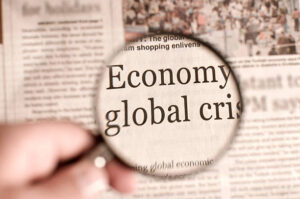World Mental Health Day is observed on 10th October each year. For 2025, the focus is on protecting mental health and wellbeing in times of global instability.
 The official annual theme is set by the World Federation for Mental Health (WFMH). For World Mental Health Day 2025 the theme is: ‘access to services – mental health in catastrophes and emergencies.’
The official annual theme is set by the World Federation for Mental Health (WFMH). For World Mental Health Day 2025 the theme is: ‘access to services – mental health in catastrophes and emergencies.’
This theme focuses on the mental health impact of natural disasters, global crises and conflicts.
Tsuyoshi Akiyama, WFMH President, says the theme is “highly opportune to the current global situation.”
The WFMH reveals that, in 2020, 100 million people across the world were affected by disaster events and that up to a third of disaster-affected people may experience mental health problems as a consequence.
WHO backs theme for World Mental Health Day 2025
 The World Mental Health Day 2025 theme has received support from the World Health Organization, which says that supporting people’s mental health during global crises and disasters “is not just important – it saves lives, gives people the strength to cope, the space to heal and to recover and rebuild not only as individuals, but as communities.”
The World Mental Health Day 2025 theme has received support from the World Health Organization, which says that supporting people’s mental health during global crises and disasters “is not just important – it saves lives, gives people the strength to cope, the space to heal and to recover and rebuild not only as individuals, but as communities.”
The international body of public health experts adds:
“That’s why it is essential for everyone, including government officials, health and social care providers, school staff and community groups to come together. By working hand in hand, we can ensure the most vulnerable have access to the support they need while protecting the well-being of everyone.
“By investing in evidence and community-based interventions, we can address immediate mental health needs, foster long-term recovery, and empower people and communities to rebuild their lives and thrive.
“On this World Mental Health Day, let us intensify our efforts to create a world where mental health is valued, protected, and accessible for all, especially in the face of adversity.”
World Mental Health Day 2025 in the UK
In the UK, the Mental Health Foundation helps to lead messaging and awareness around World Mental Health Day. They say that constant exposure to news coverage of global crises and conflict can have a serious mental health impact on consumers.
The national charity suggests that, even if you are not directly affected by global events, you can still feel overwhelmed by the relentless 24/7 news cycle.
 In recent years, global populations have navigated the Covid-19 pandemic, the ongoing and worsening climate crisis, large-scale conflicts such as the wars in Ukraine and Palestine, economic instability and political unrest. To make things worse, smartphones and social media provide us with round-the-clock access to the latest news, live coverage, opinion pieces and even misinformation.
In recent years, global populations have navigated the Covid-19 pandemic, the ongoing and worsening climate crisis, large-scale conflicts such as the wars in Ukraine and Palestine, economic instability and political unrest. To make things worse, smartphones and social media provide us with round-the-clock access to the latest news, live coverage, opinion pieces and even misinformation.
While staying informed about the world around us can be a positive and proactive thing to do, constant consumption of negative news can severely impact our mental health.
Many people are left feeling helpless, hopeless, guilty, anxious, overwhelmed and emotionally drained as a result of late night doomscrolling and continual exposure to distressing news content.
Managing overwhelm during global crises
 Thankfully, the Mental Health Foundation says that there are steps we can take to manage this overwhelm, as well as our news consumption and the impact of doomscrolling.
Thankfully, the Mental Health Foundation says that there are steps we can take to manage this overwhelm, as well as our news consumption and the impact of doomscrolling.
The charity adds:
“We may not have the power to influence or change everything we’d like to on a global scale. But there are things we can do to protect ourselves and others from feeling overwhelmed and hopeless in the face of current events.”
We can experience feelings of overwhelm after being exposed to continual stress, and this can result in physical, mental and emotional changes, including:
- Experiencing aches and pains, feeling tired all the time and having sleep issues, digestive problems and physical habits such as nail biting (physical)
- Having trouble concentrating or making decisions, low motivation, memory problems and constant worrying and anxiety (mental)
- Feeling irritable, angry, sad, numb or even feeling “stuck” or in despair (emotional)
The Mental Health Foundation says positive steps to help manage overwhelm can include:
- Set boundaries with the news, limiting the amount of news content you consume and when you do it
- Use grounding exercises to ease your stress response
- Have set phone-free times or zones
- Connect with family and friends when you’re feeling overwhelmed
- Look after yourself and give yourself permission to rest; it doesn’t mean you have stopped caring about the troubles of others
- Focus on what you can control. Positive actions such as donating money, signing petitions and writing to your MP can help you to overcome feelings of helplessness
Take control of your doomscroll this World Mental Health Day
 ‘Doomscrolling’ is the term often given to the act of constantly scrolling through negative news on your smartphone, either on social media or news apps, for prolonged periods of time. Although the aim may be to stay informed, doomscrolling can become an unconscious habit, with people scrolling on their phone for much longer than they had meant to. This often leaves people feeling anxious, sad or overwhelmed.
‘Doomscrolling’ is the term often given to the act of constantly scrolling through negative news on your smartphone, either on social media or news apps, for prolonged periods of time. Although the aim may be to stay informed, doomscrolling can become an unconscious habit, with people scrolling on their phone for much longer than they had meant to. This often leaves people feeling anxious, sad or overwhelmed.
This World Mental Health Day, the Mental Health Foundation is highlighting its practical tips and advice for managing the impact of doomscrolling and ensuring healthier news consumption. These include:
- Use your phone settings to turn off any ‘push’ notifications or instant alerts for social media or news apps to prevent you from being sucked into constantly scrolling through negative news
- Use a watch or physical alarm clock to wake you in the morning instead of your phone – this allows you to leave your phone in a different room and break the habit of doomscrolling in bed, which could lead you to stay up later than you should and then go on to negatively impact your sleep
- Curate your social media feed. You can block, hide or unfollow certain profiles that may spark negative feelings, anxiety or overwhelm. Limiting the negative content you are exposed to can help improve your mood and also influence your algorithm – so less content of that type is recommended to you.
- Set time limits to minimise your scrolling on news apps and social media. This could mean setting an alarm or set other markers of time – for instance, the Mental Health Foundation
 suggests only scrolling for the amount of time it takes to make a cup of tea.
suggests only scrolling for the amount of time it takes to make a cup of tea. - Again, create no-phone zones – such as the bedroom or dining room – to reduce the amount of time you spend online.
- Balance doomscrolling sessions with activities that will positively impact your mental health and emotional wellbeing, such as a mindfulness session, reading, spending time with loved ones, exercising, walking in nature or a relaxing bath.
Get involved this World Mental Health Day
The Mental Health Foundation has provided a range of posters and social media graphics that are free to download and share, enabling anyone to help spread awareness about World Mental Health day 2025. Their advice sheets are also free and available to download online.
People are also encouraged to participate in World Mental Health day by hosting events. Last World Mental Health Day, 7,000 Tea & Talk events were hosted across the UK and attended by 260,000 people.
Schools, workplaces, community groups and families can host their own Tea & Talk to open up conversations about mental health and raise money for the Mental Health Foundation. The Mental Health Foundation offers a range of free resources to help support these events.
The charity also hosts challenges, and for World Mental Health Day 2025 they are encouraging people to sign up to Walk 100 Miles in November. This physical challenge can benefit mental health and wellbeing while raising awareness and vital funds.
World Mental Health Day campaigns across the UK
 Ultimately, World Mental Health Day was established to encourage everyone to talk about mental health and show that it matters.
Ultimately, World Mental Health Day was established to encourage everyone to talk about mental health and show that it matters.
A number of other UK charities and bodies support World Mental Health Day. Mental Health UK provide a range of free resources and tools to support mental health and empower people. For World Mental Health Day 2025 they are exploring the parallel theme of ‘Good mental health isn’t a constant.’
They explain:
“Everyone goes through difficult times, and today more than ever, people are facing increasing pressure.
“Poor mental health can affect anyone, and is often linked to experiences like trauma, money worries or stress. Trauma can take many shapes, and its impact feels different for everyone, making every experience unique and personal.”
Meanwhile, Mind is urging everyone to join their campaign “to fight for mental health today to inspire a brighter tomorrow.”
The leading national mental health charity says:
“Mental health matters on the days when everything happens and the days when nothing happens. When life is busy and unpredictable and when it’s quiet and ordinary too. That’s why we fight every day, to support more people tomorrow.
“10 October is World Mental Health Day, but we want everyone to understand that mental health is important every day. Together we can make sure everyone sees it that way.”
Rethink Mental Illness are also campaigning this World Mental Health Day, calling for people to receive the ‘Right Treatment, Right Time.’ They are calling for measures to slash mental health waiting lists, invest in specialist services and ensure people can get the care and support they need, when they need it, and before they reach crisis point.
Empower yourself through mental health training
 Mental health learning and development solutions can play a significant role in helping people to recognise risk factors and proactively support positive mental wellbeing across the UK.
Mental health learning and development solutions can play a significant role in helping people to recognise risk factors and proactively support positive mental wellbeing across the UK.
First Response Training (FRT) is a leading national training provider delivering courses in subjects such as health and safety, first aid, fire safety, manual handling, food safety, mental health, health and social care and more.
An accredited Mindful Employer themselves, FRT’s specialist mental health training courses include Understanding Mental Health, Mental Health Awareness in the Workplace, Managing Stress, Anxiety and Phobias Awareness, Self-Harm Awareness and Suicide Awareness.
They can also provide qualified, approved trainers to deliver accredited Mental Health First Aid (MHFA) training courses, including the Adult, Youth and Lite versions.
A trainer from FRT says:
“It’s so important that we continue to talk about mental health and that we check in on the people close to us. Supporting each other – particularly in challenging times, whether this relates to the global situation or more personal issues – is key to protecting mental health and emotional wellbeing throughout the year.
“The theme for World Mental Health Day 2025 also reminds us that we can be proactive in managing our own mental health. It’s important for us to be aware of things that impact our mental and emotional wellbeing, to be able to talk about these issues and how we’re feeling, and to take practical steps to manage these impacts.
“Training in key ways to support and promote positive mental health can empower individuals to support and promote their own mental health and build their emotional resilience. This can ensure we are better placed to help others and take positive steps to respond to global crises in the ways available to us.”
Resources to support mental health and wellbeing
A brief summary of our mental health training can now be downloaded as an infographic.
We also have a number of other free infographics available to download which provide simple tips for helping to manage your mental wellbeing. These include:
- Manage Your Stress
- Support Your Mental Health
- Connect With Nature
- Anxiety Factsheet
- Manage Your Anxiety
- Managing Panic Attacks
You can also download our free Guide to Mental Health Training from our website.
For more information on the training that FRT can provide, please call them today on freephone 0800 310 2300 or send an e-mail to info@firstresponsetraining.com.

 suggests only scrolling for the amount of time it takes to make a cup of tea.
suggests only scrolling for the amount of time it takes to make a cup of tea.